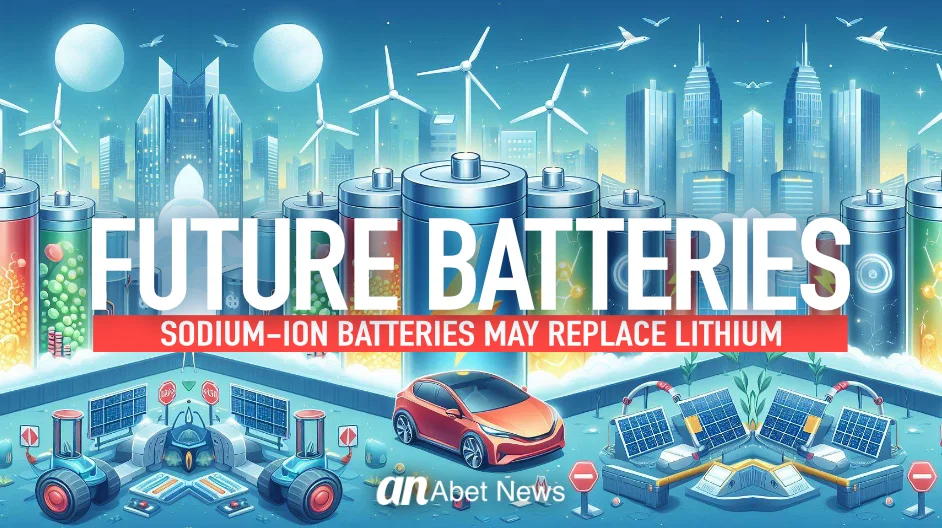Future Batteries: Sodium-Ion Batteries May Replace Lithium

The Rise of Sodium-Ion Batteries: A Green Revolution in Energy Storage
Lithium-ion batteries are the dominant technology for electric vehicles (EVs) and renewable energy storage. They offer high energy density, long cycle life, and fast charging. However, they also have some drawbacks, such as high cost, limited supply, environmental impact, and safety risks. These challenges have motivated the search for alternative battery technologies that are cheaper, more abundant, more eco-friendly, and more stable.
One of the most promising candidates is sodium-ion batteries, which use sodium ions as charge carriers instead of lithium ions. Sodium is the sixth most abundant element on Earth, and it is widely available in seawater and salt deposits. Unlike lithium, which requires complex extraction and refining processes, sodium can be easily obtained and processed. This makes sodium-ion batteries much more cost-effective and accessible than lithium-ion batteries.
Advantages of Sodium-Ion Batteries Over Lithium-Ion
Sodium-ion batteries also have some advantages over lithium-ion batteries in terms of performance and safety. Sodium-ion batteries can operate at lower temperatures, which makes them suitable for cold climates and reduces the need for cooling systems. Sodium-ion batteries are also less prone to thermal runaway, which is a phenomenon that causes lithium-ion batteries to overheat and catch fire. Sodium-ion batteries have a higher thermal stability and a lower flammability than lithium-ion batteries.
Challenges and Innovations in Sodium-Ion Battery Technology
However, sodium-ion batteries are not without challenges. One of the main drawbacks is their lower energy density, which means they can store less energy per unit volume or weight than lithium-ion batteries. This makes sodium-ion batteries larger and heavier than lithium-ion batteries, which limits their applications in portable devices and EVs. Sodium-ion batteries also have a shorter cycle life, which means they degrade faster and need to be replaced more often than lithium-ion batteries.
Leaders in Sodium-Ion Battery Technology
Despite these limitations, sodium-ion batteries have shown great potential in some niche markets, such as grid-scale energy storage, backup power, and low-cost EVs. Several companies and researchers are working on improving the performance and durability of sodium-ion batteries, as well as developing new materials and designs. For example, Chinese battery giant CATL recently announced that it would supply automaker Chery with sodium-ion batteries for its EVs. Other battery companies like SVOLT and French-based startup Tiamat are pursuing similar technology. In the US, California-based Natron Energy and UK-based Faradion are focusing on sodium-ion batteries for stationary applications, such as grid storage and backup power.
Natron Energy is an energy storage company that develops sodium-ion battery solutions leveraging Prussian Blue electrode materials. The company was founded in 2012 as a Stanford spin-off and is based in Santa Clara, California. Natron’s batteries are designed for high power, long life, and low cost applications, such as data centers, industrial mobility, EV fast charging, and grid storage. Natron claims to have the world’s first UL 1973 listed sodium-ion battery product and has shipped more than 2MW of batteries to date.
Natron Energy is a private company and does not have publicly traded stocks. However, the company has raised $35 million in Series D funding in July 2020, led by ABB Technology Ventures, NanoDimension Capital, and Volta Energy Technologies. The company has also received grants from the US Department of Energy, the California Energy Commission, and the Office of Naval Research.
Other companies that are investing in sodium battery technology
Aquion Energy: This company produces aqueous hybrid ion (AHI) batteries, which use sodium ions and water-based electrolytes. The company claims that its batteries are environmentally friendly, long-lasting, and safe.
Natrium: This company is a joint venture between TerraPower and GE Hitachi Nuclear Energy, which aims to develop a new type of nuclear reactor that uses molten salt as coolant and sodium metal as fuel. The company says that its technology can provide clean, reliable, and affordable energy.
Zoolnash: This company was founded in January 2021 in Suzhou, China. The company’s scientist, Zhao Jianqing, has 15 years of experience in sodium-ion battery development and holds several leading patents on the technology. The company has successfully developed technologies for the preparation of three sodium-ion battery cathode materials, and its soft pack battery samples have been tested by a third party, with performance indicators far exceeding those of competing products.
Zoolnash has secured two rounds of funding in three months, proving the exclusive competitiveness of the company’s core technology. The company has reached strategic cooperation with a number of customers, and the first generation of mass production products will start delivery within the year.
Zoolnash is also a publicly traded company on the London Stock Exchange under the ticker symbol ZOO.L. The current stock price of Zoolnash is 57.00 GBp, down 1.04% from the previous close.

Sodium-ion batteries are still under development and not widely used in commercial applications. However, they have the potential to become a viable alternative to lithium-ion batteries in the future, especially for large-scale and low-cost applications. Sodium-ion batteries may not replace lithium-ion batteries entirely, but they may complement them and diversify the battery market. As the demand for clean and sustainable energy grows, sodium-ion batteries may play an important role in the transition to a low-carbon economy.
Colby Zaire





